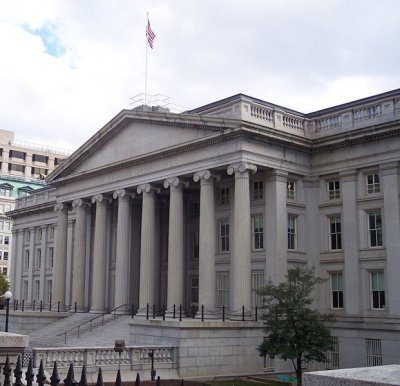| < | Wavepacket Blog only displaying 'economics' posts |
> |
| << Newer entries << | |
| 2009 | |
| May | |
| Wed May 6 22:41:32 2009 Is Torture Worth It? |
|
| 2008 | |
| October | |
| Sat Oct 4 22:13:42 2008 Is Capitalism Dead? |
|
| Sat Oct 4 21:32:25 2008 Congress says Yes |
|
| >> Older entries >> | |
| >> links >> | |
| Wed May 6 22:41:32 2009 Is Torture Worth It? The Economics of Collateral Damage |
|
| Lately, the
torture memos have been making news (and see more information about the memos at
the ACLU's website).
The left claims that torture is immoral, the right claims that Bush kept us safe. I have no intention or desire to write a political blog, so I'll stay out of that. But a state's decision to use torture has economic (game theoretical) implications, and it's worth considering those. And it's more than just torture: how far do you go to respect human rights? For instance, we have killed a lot of civilians in the Iraq war alone, and just today we apologized to Afghanistan for killing so many of their citizens in airstrikes. Here is one thought experiment: suppose a large terrorist faction hides people and material in a large United States city. The government discovers that the faction exists in the city, but doesn't know exactly where. Is it okay if the government bombs city blocks it suspects may contain terrorists, but isn't sure, even if there are a lot of innocent US civilians also there? I don't think the government would do such a thing. I'm guessing risking US civilian lives would not be an option at all. However, a different standard clearly applies for non-US citizens. We bombed large sections of Baghdad, killing hundreds of civilians, based only on rumors of Saddam Hussein's whereabouts. (In the end, all those civilian deaths were in vain, since Saddam was captured without a shot in Tikrit). And we continue to shell Afghan villages with less safety checks than we would use for US towns. Game-Theoretical reasons the US should not respect human rights:
Most of the above reasons are only valid in the short run. If an "abandon all human rights" policy prolongs or intensifies the conflict, then any short-term savings in lives or money are likely to be swamped by the costs (in money and lives) of a longer or more intense conflict. And #4 (would-be terrorists will think twice) assumes that terrorists are rational, and they almost always aren't. I don't think a strategy will get very far if it assumes terrorists are rational. A better (and probably safer) strategy is to assume that terrorists aren't rational, except in a twisted way that they want to inflict as much damage as possible. For those sorts of worst-case terrorists, #4 (promising them punishment) won't help. Instead, the approaches should focus on the people who are rational. These are typically the civilian populations that house, feed, and supply terrorists, and the politicians in those areas. The civilians involved are either coerced or sincerely believe they are doing the right thing by helping the terrorists. Politicians as a whole are shrewd calculators and strategies that open up political advantages to cracking down on or disavowing terrorism will likely yield results. Game-Theoretical reasons the US should respect human rights:
For these sorts of asymmetric conflicts, claiming the moral ground may actually be a key to winning. Our short-term costs, in terms of money and time, may be higher (and we may have to spend more money to protect lives!) but over the long run, this is the approach that will win allies and even the terrorists' host populations. Any strategy that antagonizes the host populations runs the risk of prolonging the conflict, and any strategy that antagonizes the host populations and our allies is almost certainly doomed to failure in the long run. So based on what I hope is a relatively dispassionate consideration, respecting human rights is the best long-term way to win the conflict. And by "respecting human rights," I'd recommend treating every civilian on the planet as if they were a US citizen, at least when considering military options. It makes military operations much more complex and expensive to plan, but has the best chance of keeping the conflict short and winning many allies. This argument does assume one thing: that there is a moral high ground. If all morals are relative, then none of this applies and we're back to a most-aggressive-combatant-wins strategy. And in that case, "terrorist" is also a relative term. So I'll stick with my assumption that there is a moral high ground. Comments |
Related: > economics < geopolitics Unrelated: books energy environment lists mathematics predictions science |
| Sat Oct 4 22:13:42 2008 Is Capitalism Dead? Apparently some people think so... |
|
| In
Congress says Yes, I noted that the Emergency Economic Stabilization Act of 2008 has been
passed into law.
Not surprisingly, other people have noted that too. This week's copy of The Week led with an article titled "Is Capitalism Dead?", featuring a caricature of Adam Smith's tombstone with the dates 1776-2008. The byline was "A bitter farewell to the free market." Inside, the magazine gave different viewpoints on the impact of the passage of the Act. On the right, people claimed "Capitalism is Dead." On the left, people claimed "Capitalism has Evolved." I was surprised that so many people got it dead wrong! Was Capitalism killed by the Great Depression? The nationalization of industries, and founding of the welfare state, didn't seem to have killed of Capitalism at all! The article did mention the Great Depression tangentially, but none of the impact was mentioned. Likewise, think of World War II. Most of the economy was controlled. Prices were fixed for many commodities and foodstuffs. The government had people buy war bonds to keep inflation down. This was massive government intervention into the economy, nothing like a free market at all! Not surprisingly, that didn't come up in the article. I think the truth is more nuanced. The free market is an economic game played with certain rules. Within the boundaries of the rules, it is a free market in that players (consumers, business, employers, employees, etc.) are free agents empowered to make their own choices--and in particular, to invest their time and money in whatever ways they think will maximize their return. This is as true for individuals and employees just as much as it is for the corporations that employ and sell to them. However, the rules themselves are set by those empowered to control the markets. The Federal Government has always changed the rules when necessary (Great Depression, World War II). This is just another case. Don't get me wrong, I do not like the Emergency Economic Stabilization Act. But don't confuse that Act with the end of Capitalism! This is just another (possibly successful!) attempt to change how the markets operate to make the country better off. Even Adam Smith was aware that markets play by the rules set by the governments that can control them. In his time, the dominant economic principal was Mercantilism, which had a huge impact on the "free market" and how the United Kingdom dealt with her colonies and other nations. I think the claim that the EESA kills capitalism rests more on ignorance of how governments and capitalism interact than reality. I suspect that in 5-10 years we will be in another boom cycle and people will again be saying it proves how Capitalism is the best system in the world. Of course, we'll still be paying for EESA. Comments |
Related: > economics < Unrelated: books energy environment geopolitics lists mathematics predictions science |
| Sat Oct 4 21:32:25 2008 Congress says Yes The $700B bailout is now law. |
|
| In
Just say No, I celebrated that Congress had not passed the
Emergency Economic Stabilization Act. In my view, that would be money spent on Wall Street financiers without
clear benefit for US taxpayers.
However, the House and Senate have now approved an amended version of the Act, and Bush signed it into law on Friday. So now $700B of our money will be given to Wall Street. I am disappointed! I do feel that this will save mostly the wealthy investment banks, based on a sense of panic. I know credit markets tightened, but was this the only way to loosen them? Well, it is sad, but at this point it is now up to the Treasury and the Federal Reserve to implement the plan wisely. [As an aside: I did receive a nice form letter from Senator Murray as a response to my open letter. And I'm not being facetious--I'm sure it was actually a lot of work to properly respond to everyone that contacted her, even with a form letter.] With luck, the people holding the purse strings will be able to keep the money from flowing into doomed investment instruments. We will know in a few years! Comments |
Related: > economics < Unrelated: books energy environment geopolitics lists mathematics predictions science |
| Links: |  |
Blog Directory | Blog Blog | Technorati Profile | Strange Attractor |


